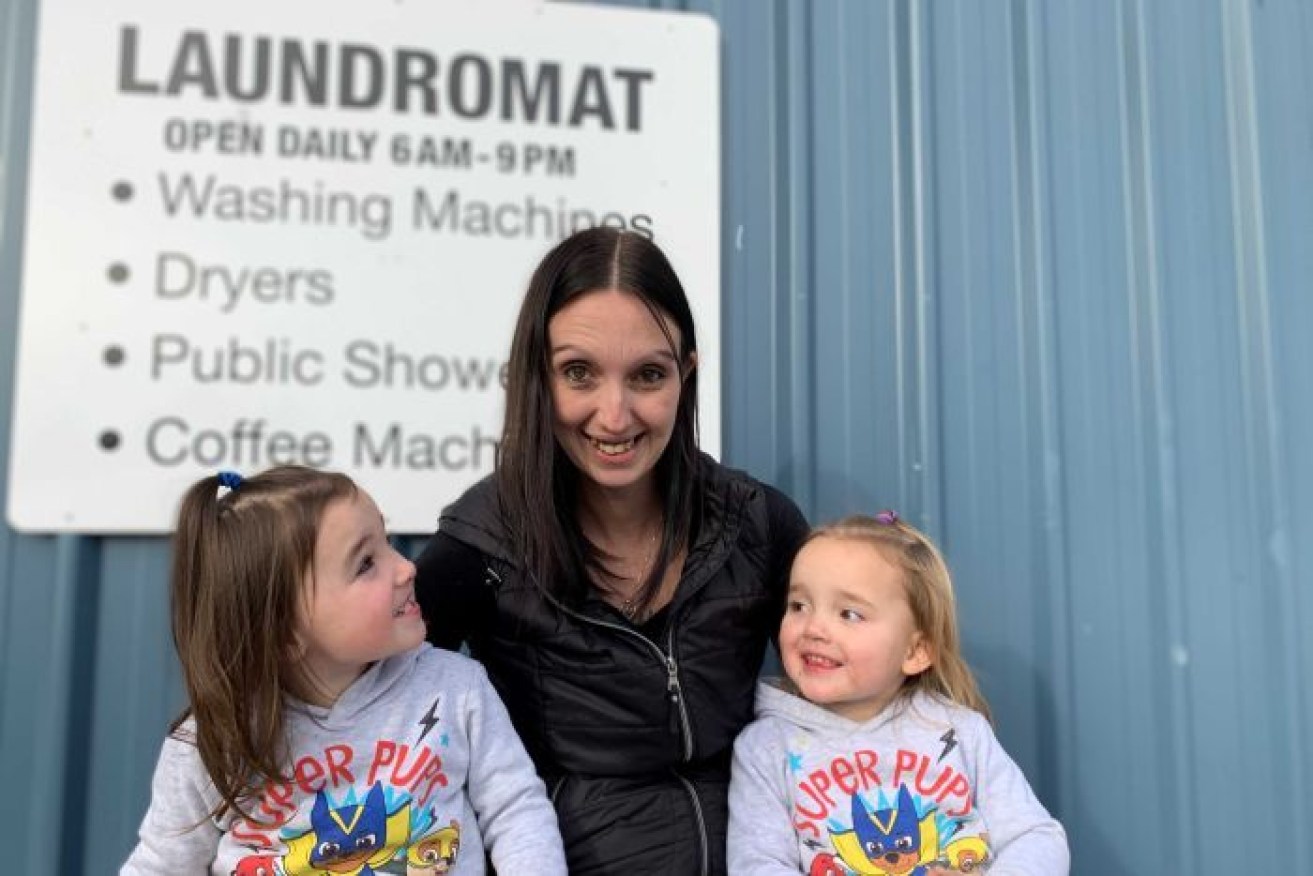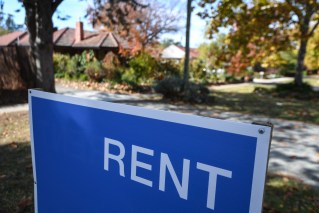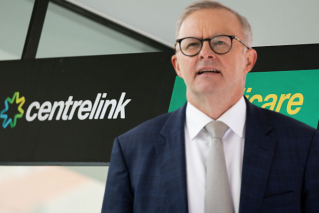Whistleblowers say some job service providers are exploiting the ParentsNext welfare scheme

Mel with two of her four children. Photo: ABC
Whistleblowers are warning a $351 million government program aimed at getting parents back to work is exploiting vulnerable single mothers, and even the homeless.
At the centre of the controversy is ParentsNext, a program some people must take part in to receive parenting payments from Centrelink. It is also the first Australia-wide program to allow private employment service providers to decide who must participate.
The ABC’s Background Briefing has interviewed current and former employees in Australia’s lucrative employment services sector who claim some caseworkers are pressured to sign and retain people who face significant personal crises, even though departmental guidelines stipulate they should be exempted.

The federal government rolled out ParentsNext in 2018. Photo: ABC
Homeless but signed up anyway
Mel, 33, is one of more than 3000 homeless Australians who’ve been signed up to ParentsNext, despite having no fixed address to take a shower or prepare a warm meal for her kids.
A mother of four, Mel has spent more than two years on Tasmania’s public housing waiting list.
She was furious when she received a letter demanding she undergo an eligibility assessment for ParentsNext or her parenting payments would be cut off.
“It’s degrading, it’s making us feel like we’re lazy, like we’re not doing nothing for our kids,” said Mel, whose last name is being withheld for privacy reasons.
Guidelines from the Department of Jobs specify Centrelink could have exempted her from participating because of her homelessness.
Mel was instead referred to a local non-profit community provider, Workskills, which was paid a government fee just for her turning up.
Under ParentsNext, employment service providers are paid $600 for each new recipient they take on.
Mel was exempted at her first meeting with Workskills, but will be re-examined for eligibility in 12 months. She says she can’t understand why the department did not exempt her straight away.
Despite the exemption, Mel’s parenting payment was cut off last week after she forgot to tick a box declaring her zero income to Centrelink.
Industry peak body does an about face
ParentsNext was rolled out nationally in July 2018. Most of the 93,000 participants are single mothers and failure to comply with any of the ParentsNext obligations can lead to suspension of the Centrelink parenting payment.
Simone Casey was the top policy adviser at the industry’s peak body, Jobs Australia, during a federal senate inquiry into the employment services sector earlier this year.
Members had been split on whether Jobs Australia should advocate to scrap the existing ParentsNext model. Ms Casey had previously made the case ParentsNext punished parents for matters beyond their control and initially Jobs Australia supported this position to suspend the so-called “targeted compliance framework”.
“The feedback I was given was that our board, members of our board were not happy with the positions that we’d been advocating and that I’ve been leading Jobs Australia with,” Ms Casey said.
“After the Senate inquiry I was told to just not do anything more on ParentsNext. And I was really confused actually because I thought it was something that we had taken a moral high ground on.”
Even though many of these organisations were non-profit, Ms Casey believes they depend on the scheme for contracts.
“They want to maintain their existence and they want to maintain the employment of their staff, and risks to their income undermine their ongoing stability.”
Ms Casey believes Jobs Australia was moderating its criticism of ParentsNext because some members, including the Western Australian provider, Communicare WA, didn’t want to risk losing ParentsNext contracts.
“Communicare have lost a number of other employment services contracts recently, including their Jobactive contract. I could get the sense that there were financial tensions there, around needing to keep the ParentsNext program in place as it was,” Ms Casey said.
The federal government initially valued Communicare WA’s Jobactive contract at $88 million.
Communicare WA has consistently received the lowest possible rating under the Jobactive performance framework.
In a statement, Jobs Australia told the ABC it had softened its approach following feedback from some of its members.
It said no staff members were told to stop speaking publicly about ParentsNext.
“While Jobs Australia still has concerns about [the targeted compliance framework], it understands the need for a level of compliance,” read the statement. “The key priority is to ensure a correct balance between compliance and engagement in the program.”
Employment Minister Michaelia Cash also responded to Background Briefing in a statement.
“The Targeted Compliance Framework is not punitive,” she said.
“Participants who are genuinely trying to meet their requirements but are simply having difficulty doing so are not unfairly penalised.”

Employment Minister Mchaelia Cash has denied the system is punitive. Photo: ABC
Whistleblowers at employment service providers speak out
Several caseworkers Background Briefing spoke to believe the system was being manipulated by some providers.
One former caseworker with the Melbourne non-profit organisation CVGT, Carol*, said she had noticed extreme pressure on staff in some instances to keep vulnerable clients in the program, to achieve budget targets.
“It was, ‘keep that person active’, especially if we’re coming up to the end of a quarter and we found that we hadn’t met our budget in a particular way,” she said.
Private providers are paid an additional $600 fee by the government for every participant they keep in the program for six months.
Carol also claims CVGT sometimes actively encouraged staff to find clever ways to refuse medical exemptions, even if supported by medical certificates, to retain clients over rollover periods.
“You could pick at the wording of the medical certificate and tell them it wasn’t enough to grant the exemption at that point in time and they had to go back to the doctor to get another one,” she said.
Carol said she was fired from CVGT after she complained about the practices. She said CVGT told her she was the subject of two complaints from clients and took too long on smoking breaks.
In a statement, CVGT said it was regularly audited by the Department of Human Services.
“Recent audits and reviews have not identified any areas of concern in the manner in which CVGT administers this program.”
Tony* is a six-year veteran of the employment services industry and made a similar allegation about his former employer, PeoplePlus.
He explained he was told to not let clients know about exemptions, especially the exemption for people with four or more children.
“If they don’t ask about it, then we don’t let them know, which I don’t think is obviously the right thing to do because it’s all about giving the correct information,” he said.
“We don’t choose the information that we give to people. We are given information and guidelines from Centrelink and we are supposed to follow those guidelines.”
The executive chairman of PeoplePlus and its largest shareholder is Con Kittos. Background Briefing approached him for a response, but was told he was on holidays in Europe and was unavailable.
PeoplePlus also refused an interview, but provided a statement: “PeoplePlus follow government guidelines in relation to exemptions … If we were to become aware of any behaviour outside these guidelines we would take it very seriously and take action immediately.”
*Some names have been changed to hide the person’s identity.








